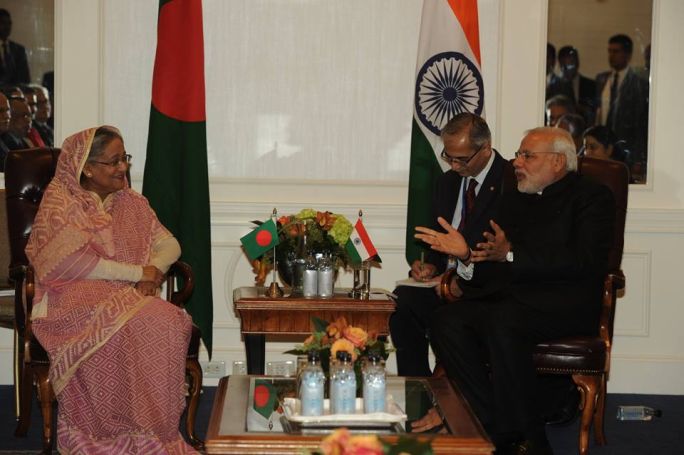Sheikh Hasina in India for crucial Teesta pact

Prime Minister Narendra Modi receiving Bangladeshi Prime Minister Sheikh Hasina at the Palam airport in New Delhi
Prime Minister of Bangladesh, Sheikh Hasina’s four-day visit to India, holds the key to a number of mutually beneficial decisions that both countries intend to reach.
India and Bangladesh are immediate neighbours with deep-set economic, cultural and social likeliness to each other. Over the years, the relations have gone from strength to strength, with Bangladesh playing an important ally in India’s ascendancy as a continental and global superpower in making. With general elections looming in 2018, stakes are high for Bangladesh Prime Minister, Sheikh Hasina and her Awami League. Her visit to India and how fruitful it is in ticking the right boxes will manifest Awami League’s chances in the elections.
To further the bonhomie and underline the camaraderie between India and Bangladesh, Indian Prime Minister, Narendra Modi made an impromptu trip to the Palam airport in New Delhi to receive his Bangladeshi counterpart. Minister of External Affairs, Sushma Swaraj also called on Hasina shortly after her arrival.
Key Issues
Defence arrangements are expected to be talked upon. It holds an added relevance as Bangladesh procured a Chinese-built submarine in November 2016. With China gradually expanding its military outreach across South Asia, India is sceptical of Chinese presence in the Bay of Bengal. Especially with Sri Lanka looking more and more vulnerable, India cannot risk Bangladesh walking the other way as well. In this quest, India has already offered to train Bangladesh’s submarine crew in Visakhapatnam. Therefore, it comes as more than just speculation that the two delegations would like to strike an agreement pertaining to a bilateral defence framework. When such an agreement is inked, it will help calm Indian nerves and will bode well with BNP for the elections. The agreement is expected to initially run for five years, with the option of renewal. In total, 17 MoUs are expected to be tabled, with a number of them dedicated to civil nuclear energy, train services between Kolkata in eastern India and Khulna and Dhaka in Bangladesh, shipping, fisheries and the gas pipeline project where Myanmar is also involved.
Teesta Brouhaha
In this rather peaceful and benevolent relation that the two countries have maintained, the one vitriolic issue that they have failed to resolve is the water sharing of River Teesta. While Modi, on his last visit to Dhaka, emphasised upon the need and the urgency of a fair agreement, nothing has come of it. His predecessor, Manmohan Singh, too, had made promises that his government failed to live up to. One of the main reasons, if not the only one, any such pact not coming to fruition is West Bengal Chief Minister Mamata Banerjee’s take on the issue.
River Teesta originates in Sikkim, flows through northern parts of West Bengal before flowing in to Bangladesh, where it finally meets the Brahmaputra (better known as Jamuna in Bangladesh). Reports suggest that while 21 million people in Bangladesh rely on Teesta, only about a third of that population is benefitted in Sikkim and West Bengal taken together. Also, with India, especially West Bengal, controlling the water, Bangladesh either gets too little or too much of it. Multiple agreements have been mooted in the past, but the issue remains unresolved.
With Banerjee at loggerheads with Modi, India’s internal political equation can ruin the chances of Teesta water sharing resolution. Banerjee is slated to meet Hasina in Rashtrapati Bhawan, with Modi expected to be in attendance. The Bangladesh PM and West Bengal CM have shared a warm personal relation over the years, and it now remains to be seen whether that helps in settle this longstanding quagmire. New Delhi will be eager to have Dhaka on its side in order to keep China’s chequebook diplomacy and ‘string of pearls’ ambitions at bay.









